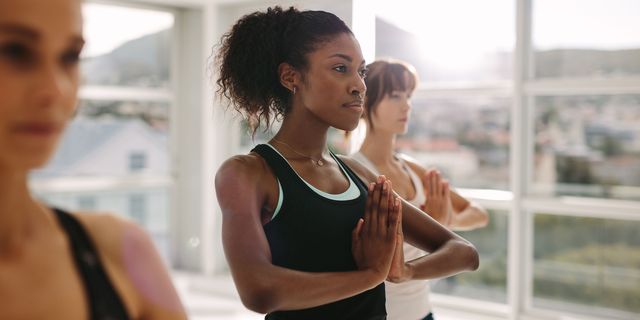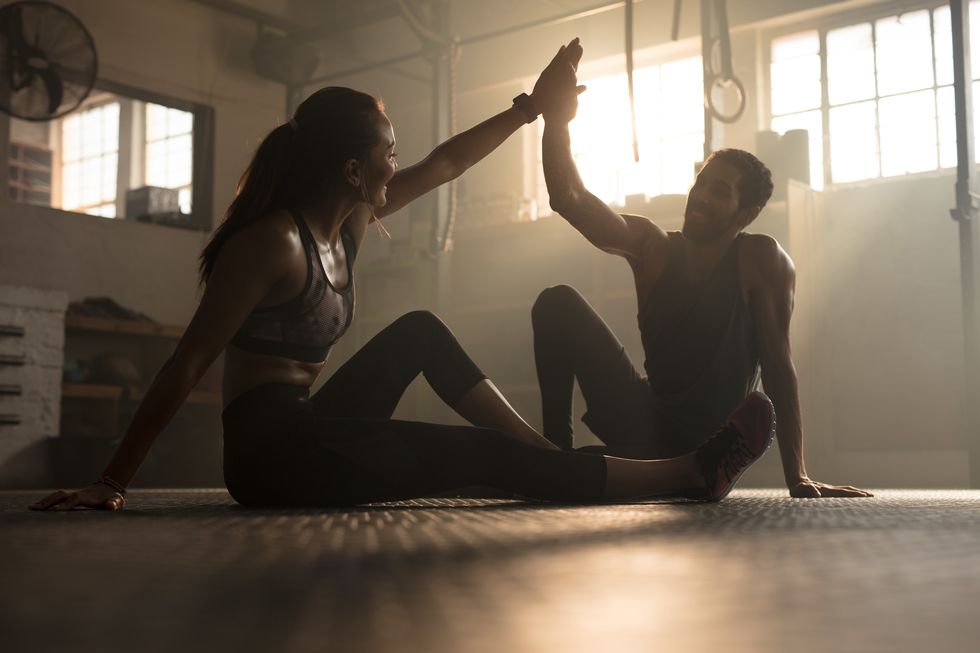You know the deal. It's Sunday morning. You've just woken up with the mother of all hangovers and start scrolling through Instagram to find out how your friends and favourite A-listers spent their weekends.
But it's not the perfectly-poised mochas in Wes Anderson-inspired coffee joints, or Zara changing room selfies that fills you with that mid-morning dread. No, it's the #fitspiration snaps of athlethically-blessed gym bunnies deadlifting alongside expertly-trained (and undoubtedly ridiculously expensive) personal trainers.
Next thing you know, you're Googling PTs in your local area who will help you burn off last night's Big Mac.
Having a professional fitness coach on hand is the perfect source of motivation and accountability, helping even the most lackadaisical of gym-goers improve their technique and set realistic goals.
But before you invest hundreds of pounds on PT sessions, it's important to know whether you're investing in someone who can get you as fit as they appear to be themselves. As they say, the proof is in the...press up?
'A trainer in great shape, or one who was a superstar athlete, doesn't necessarily correlate to a trainer's ability to get results for their clients,' explains Third Space Elite personal trainer Luke Worthington.
Here are some expert tips on how to the right personal trainer for you:
1. What's your fitness specialty?
A trainer with rippling abs, toned arms and wide-set shoulders means nothing to your fitness plan if they can't help you develop your own personal strength and fitness goals.
Worthington says: 'Remember you want a trainer who is going to focus on you, not themselves. Being able to be in shape yourself is an entirely different skill to knowing how to coach someone else through sustainable changes to their lifestyle. Make sure the trainers you're considering has experience working with clients like you, and with similar goals.
As a result, whether you're training for a 10km or hoping to shed a few extra pounds after a heavy few weeks of partying, it's important to find a personal trainer who specialises in the exact area of fitness you're looking for, for example weight loss or sports performance.
Ask trainers for client references or check out their website and read testimonials from previous clients.'
Jamie Ray, HIIT Instructor at Another_Space, adds that it's important to ensure your PT is passionate about what they do if you ever want to feel inspired.
'If they don't have a passion for all things health and fitness, then they won't realistically be able to motivate you and help you achieve your goals,' he says.
2. What qualifications do you have?
An Instagram page inundated with posts about workouts and 'leg days' does not make for a qualified and well-trained fitness expert.
In order to become a personal trainer in the UK, a person requires the following four things:
- Level 2 Gym Instructor Qualification
- Level 3 Personal Trainer Qualification
- First Aid Certificate
- Personal Trainer Insurance
However, Worthington believes the barrier to enter into the UK fitness industry as a PT is relatively low and often operates without much regulation.
'In my opinion the standard level 3 PT certificate (a little like passing your driving test) is when you start learning,' he argues.
'A sport or exercise science degree is a good place to start but, more importantly, I would ask your prospective trainer what educational courses they've undertaken in the past year. As well as demonstrating a commitment to continuing education, this will also give you an indication of areas your trainer is currently interested in, and where their focus of expertise lies.'
3. How do you assess new clients?
It's important to remember that personal training is exactly what it says on the tin - personalised and bespoke training programmes tailored to a clients fitness goals and physical capability.
'If you trainer doesn't have a plan to establish your starting point, he/she has very little chance of successfully guiding you to the finishing post,' ' explains Worthington who personally uses technology that biometrically scans clients' body composition.
'Assessments should ideally cover both your technical ability to perform the essential movements in the gym (squat, hinge, lunge, push, pull) as well as an appreciation of your body composition.'
Courtney Fearon, Balance Festival Ambassador adds it's important to ask a PT's availability before booking sessions.
'It's important to find out if their slots match times you can train. Your first session shouldn't be part of a package - pay for one session to get an idea of how you work together and see if it fits in with your schedule.'
Ambassador Charlotte Holmes continues: 'Be honest with yourself and your trainer about how realistic you can commit to this new venture per week.
'Don't overdo it to start with, you can always add in extra sessions as you go. You're only going to disappoint yourself and your PT if you have to cancel so make sure your trainer books in sessions that actually fit around your busy lifestyle.'
4. Do you create meal plans?
While personal trainers often have experience in creating bespoke meal plans and can offer advice when it comes to eating right to fuel your body for workouts, a qualified nutritionist is your best bet.
'All qualified trainers must have a solid appreciation of nutrition and should be able to give you guidelines that will help you achieve your goals more quickly,' explains Worthington. 'However, a PT certification does not qualify you to prescribe supplements or eating plans that involve restricting specific nutrients or food groups.'
5. How do you track fitness goals?
There's no point in having a fitness assessment if your personal trainer - and you - don't have a clear set of fitness goals in place.
While some clients like to receive statistics, detail spreadsheets of the increased number of reps, and sets they've achieved, others like to leave the more numeric aspects of their fitness journeys to a PT. Goal tracking all comes down to personal preference.
'If you're a statistics nut, they should be able to provide you with the data they're recording (if they're not recording it, run away!),' jokes Worthington.
'Similarly, if you have enough of looking at Excel when you're at your desk, they should be reasonable enough not to inundate you with information that can be confusing.'
But don't get caught up too much on numbers - personal training sessions are meant to be inspiring, not intimidating.
'The most important thing, however, is that specific, measurable, trackable and realistic goals should be set by the trainer, agreed by the client, and regularly re-assessed.'
6. What's your preferred style of encouragement?
Whether it's being screamed at to the point of tears by a burly ex Army soldier, or having a trainer who texts you words of encouragement after a tough session, the way you want to be treated in and outside of the gym by a personal trainer varies from person to person.
'If you're unsure - ask a trainer to observe a couple of his / her sessions. They should be fine with this (given permission of their other clients of course) as its a great way of getting to know if they are the right trainer for you to achieve your aspiring goal,' says Worthington.
With thanks to Third Space, Another_Space, and Balance Festival (11-13 May) for their assistance.
From 12-31 March, Another Space is running its '7 in 7 challenge, encouraging people to complete seven classes in seven days for £77. Click here to find out. Check out Third Space's new WOD classes here.

Katie O'Malley is the Site Director on ELLE UK. On a daily basis you’ll find Katie managing all digital workflow, editing site, video and newsletter content, liaising with commercial and sales teams on new partnerships and deals (eg Nike, Tiffany & Co., Cartier etc), implementing new digital strategies and compiling in-depth data traffic, SEO and ecomm reports. In addition to appearing on the radio and on TV, as well as interviewing everyone from Oprah Winfrey to Rishi Sunak PM, Katie enjoys writing about lifestyle, culture, wellness, fitness, fashion, and more.















